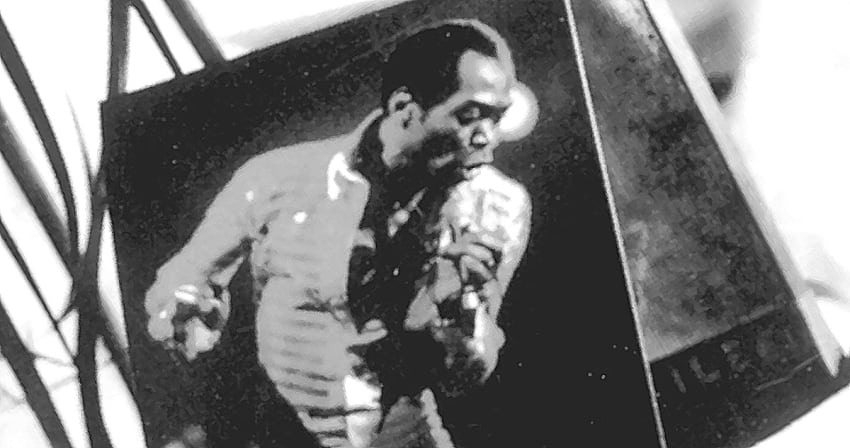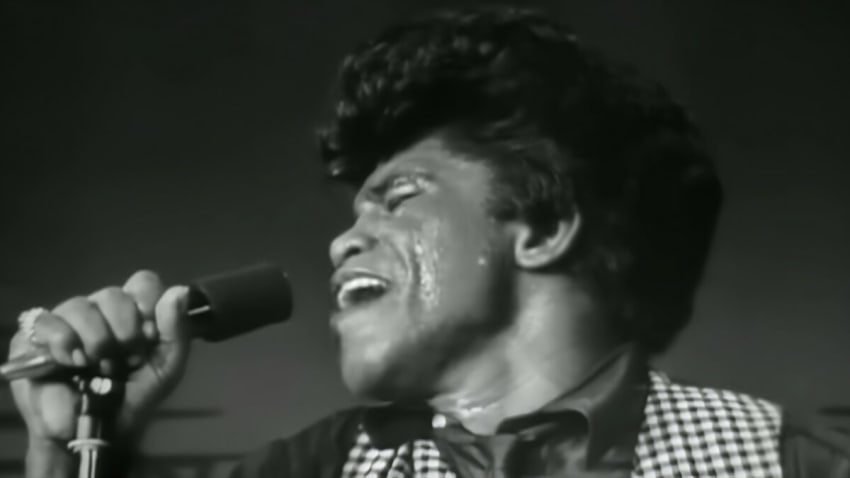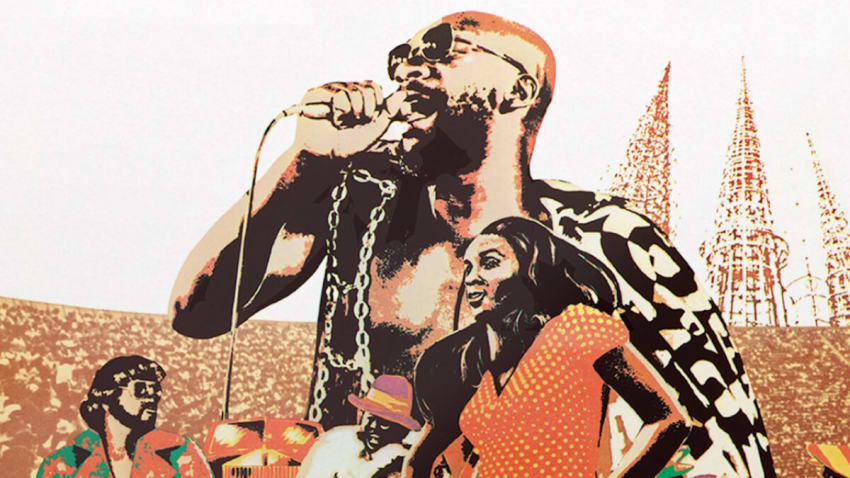The 1969 Concert That Changed Fela Kuti’s Life
An encounter with Sandra Izsadore in Los Angeles forever altered the life of the influential Afrobeat musician.
By Andy Kahn Feb 28, 2025 • 10:05 am PST

In 1969, Nigerian musician Fela Kuti arrived in the United States, along with his band Koola Lobitos, and toured the country for 10 months. During his time in America, Kuti had a chance encounter at one of his concerts, which forever changed the trajectory of the Afrobeat pioneer.
According to Fela Kuti’s official website, the tour began in May (other sources cite different dates) and included performances in Washington D.C., Chicago and San Francisco, “before ending up broke in Los Angeles.” Facing expiring visas, Fela secured an off-the-books residency at the Citadel d’Haiti, a club owned by actor Bernie Hamilton (brother of jazz musician Chico Hamilton) located on Sunset Boulevard in Los Angeles. By the end of the year, Fela renamed Koola Lobitos and began calling the group Nigeria 70.
“We played there for about five months, six nights in a week,” Koola Lobitos/Nigeria 70 drummer Tony Allen told Jay Babcock in a 1999 interview for Mean magazine. “Bernie gave us a house and we played in his club. It was grooving, you know.”
During this period when Fela was in Los Angeles, Fela was booked to perform at an NAACP event at the Ambassador Hotel in Los Angeles. Held in August 1969, the NAACP Garden Party was attended by Sandra Izsadore who became a powerful influence on Fela, whom she met that night at the Ambassador.
A Los Angeles native, Izsadore was, according to Fela’s website, “a black-rights activist in Los Angeles who introduces him to the writings of Malcolm X, Angela Davis, H. Rap Brown, Stokely Carmichael, Huey Newton, Frantz Fanon and other revolutionary thinkers. Fela later credits Izsadore with helping inspire his philosophy of Blackism.”
Advertisement
Fela detailed Izsadore’s influence in the authorized biography by Curtis Moore, Fela: This Bitch of a Life:
“Sandra gave me the education I wanted to know. She was the one who opened my eyes. I swear, man! She’s the one who spoke to me about . . . Africa! For the first time I heard things I’d never heard before about Africa! Sandra was my adviser. She talked to me about politics, history. She taught me what she knew and what she knew was enough for me to start on. Yeah, Sandra taught me a lot, man. She blew my mind really. She’s beautiful. Too much. Nothing about my life is complete without her. Sandra was the woman .. . I swear.
“I was heavy into the book she’d given me to read. It was the first book I’d read since I’d stopped reading all that nonsense from when I was in London. The only book I’d read then was a music history book for my college examination. But this book, I couldn’t put it down: The Autobiography of Malcolm X. It was the first book since the long spell of not reading. This man was talking about the history of Africa, talking about the white man. . . . Ohhhhhh! I never read a book like that before in my life.
“After Simon Templar — that fictitious man I’d wanted to imitate — here was a true story, about a MAN! Can you imagine how it took me? Ohhhhh! I said, ‘This is a MAN!” I wanted to be like Malcolm X! Fuck it! Shit! I wanted to be Malcolm X, you know. I was so unhappy that this man was killed. Everything about Africa started coming back to me.”
A few years ago, Izsadore wrote an essay for Black History Month, documenting the important relationship she formed with Fela.
“During this time of Black recognition and acknowledgement I would like to reminisce about Fela Anikulapo-Kuti who was born and given the name Fela Ransome-Kuti. He is the man I met in America in 1969… a man who literally walked with the Los Angeles Times in his shoes because he could not afford a new pair. I had no idea at the time we met, during his performance at the NAACP Garden Party, hosted at the Ambassador Hotel in Los Angeles, California that we would make historical changes in the mindset of the Nigerian people. Fela through his music has had an impact across the world. Fela and I wanted positive change for the world I thought that change could come through music… Fela was that musician.
“Here it is 52 years later, 24 years since his death, and Nigeria is still in crisis. The elders and youth, those who are suffering today in Nigeria, are hearing his music clearly now. Today, Fela is known as a musical prophet, an Icon in his country and well known by people around the world. Fela’s music most people find entertaining, the rhythms are seducing and provocative, with a true message.
“Even back as far as 1969, Fela tried opening their eyes with his lyrical content, while they swayed to his music; their eyes are wide open now. The Nigerian people are suffering from oppression caused by their own government. The very same people that were in power whom Fela fought, are the very same people in power today. This has happened through fear, rigged elections, and the outright buying of votes. Nigeria has become a government of recycled rulers! Things that I saw happening in Nigeria in 1969 that I thought could never happen in America are now happening in America.
“Fela’s music, which was relevant then, is even more relevant today, so much so the youth are asking, when was the music written? Tiwa Savage, Burna Boy, M-Josh, and Wiz-Kid all acknowledge Fela in their songs. Here in America before and after the Broadway Musical FELA! We now have Beyoncé, Kelly Rowland, Wyclef Jean, Antibalas, P Diddy and many more playing, acknowledging, and recording his music.
“Just to think that chance meeting in 1969 was the beginning of a new genre of music called AfroBeat and the beginning of a love connection that has had a major impact on the world. When I met Fela, I was searching for truth! About myself, and our race. I thought surely if I could meet an Afrikan man he would teach me the Afrikan story and I would learn the truth about our people, while learning a little more about our race and myself.
“Well, I did not get the lesson from him because I unknowingly became the teacher. I shared with Fela our story, the little that I knew from the study of Anthropology. I took it upon myself to read and know about every Black person I could find. I shared books I had read and shared stories about the Kings and Queens of Afrika. I shared and displayed that message of truth.”
Advertisement
After leaving America in 1970, Fela was soon joined by Izsadore in Nigeria. She stayed for several months, singing with his band, before returning to the United States.
While Izsadore’s influence on raising Fela’s consciousness regarding Black culture was profound, she was also responsible for introducing Fela to something else that altered his conscience.
Citing Fela’s official website again, “Izsadore can take credit for something else, too: she affirms Fela’s use of weed. Fela had first smoked in London around 1960. During his time with Izsadore, he begins to use weed daily, and continues to do so until the end of his life.”
Fela became a “marijuana smoker of epic proportions” according to Babcock’s profile. Fela’s extensive marijuana use was confirmed by his son and fellow Afrobeat musician Femi Kuti, who spoke to Babcock about his father’s legendarily potent pot concoction he called “goro.” Femi explained his dad’s process:
“He cooked a bag of grass about [two feet long], which cost just two pennies for like two weeks, soaking it with spices, honey and oils. Cooked it right, right, right down til it was THICK. Very thick! All that came out was about [an amount that would fit in a small coffee cup]. You’re only allowed to take about a spoon, and then, in maybe two or three hours, you are just so high, it’s unbelievable. It lasts the whole day, two days, three days. Fela trained a couple of people to cook it, and for six years, man, I was the only one who had authorization (except for him), to serve it round the house, to give it to anybody who wants it.
“He just wanted to get higher! He even did cocaine for a while, a month or so, but he said it stopped his sexual desires so he didn’t like that. So he made goro. When they were traveling, he always made sure the embassy gave him a note, saying the goro was medicine. Which it was. He said that was the main reason he took it: it helped his sexual desire and his creativity.”
Fela’s stint in Los Angeles was documented by the later-released album, The ’69 LA Sessions. The recordings are an early representation of what evolved into Fela’s pioneering Afrobeat style. Upon his return to Nigeria, Fela began to incorporate strong political messages into his music, knowingly doing so despite the threat of arrest and physical violence.
Listen to The ’69 LA Sessions below:
Izsadore appeared in a short documentary about Fela Kuti’s legacy. View her and others discussing Fela’s important impact on music and culture here:
Advertisement
Celebrating Black History Month
-

From Spirituals To Swing: The Historic Carnegie Hall Concerts
-

James Brown’s Groundbreaking 1964 Performance On The T.A.M.I. Show
-

When The Revolution Could Not Be Televised: Revisiting The 1969 Harlem Cultural Festival
-

A 6-Hour Soulful Expression In Front Of 100,000 People: The Landmark 1972 Wattstax Concert
[Originally Published February 29, 2024]




